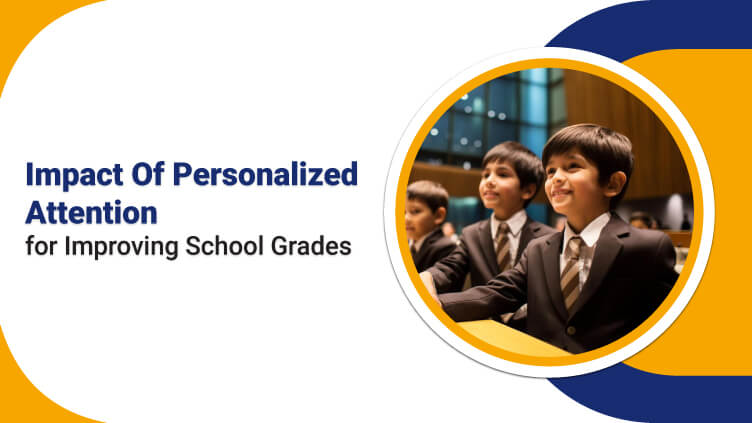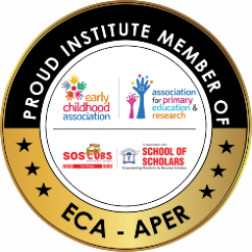Impact Of Personalized Attention for Improving School Grades
Introduction:
In the dynamic landscape of education, fostering personalized attention in learning and efficient progress tracking has become essential for nurturing academic success. As we delve into the realms of personalized education, academic support, and individual attention in schools, it’s evident that a tailored approach to learning is the cornerstone of student advancement.
Personalized Education:
Personalized education transcends the one-size-fits-all model, recognizing that each student is unique with distinct learning styles, strengths, and challenges. This approach involves adapting teaching methods, content, and pace to cater to individual needs, fostering a deeper understanding of subjects.
In the pursuit of academic excellence, schools play a pivotal role in providing the necessary academic support. By incorporating personalized education, institutions can empower students to explore their potential, instil a love for learning, and cultivate critical thinking skills.
Personalized Attention in Schools:
The significance of personalized attention in schools cannot be overstated. A classroom environment that encourages interaction, questions, and discussions facilitates a deeper engagement with the curriculum. It allows educators to identify the specific needs of each student, providing targeted academic support.
Monitoring Student Progress:
Effectively monitoring student progress is integral to gauging the efficacy of personalized education. Regular assessment and progress evaluation enable educators to identify areas of improvement and tailor learning strategies accordingly. This proactive approach ensures that no student is left behind, promoting a culture of continuous improvement.
Enhanced CBSE Learning Experience:
In the context of Indian education, particularly the Central Board of Secondary Education (CBSE), personalized learning aligns with the CBSE curriculum. This alignment not only ensures compliance but also enhances the CBSE learning experience. It enables students to navigate their academic journey seamlessly while adhering to the prescribed standards.
Individualized Student Advancement:
The crux of personalized attention lies in individualized student advancement. By recognizing and addressing the unique needs of each learner, schools contribute to the holistic development of students. This approach extends beyond academics, fostering a sense of self-confidence and a passion for lifelong learning.
Effective Doubt Resolution:
Personalized education involves effective doubt resolution mechanisms. Encouraging students to seek clarification on concepts they find challenging creates a foundation for comprehensive understanding. This not only enhances academic performance but also cultivates a proactive and inquisitive mindset.
Conclusion:
The paradigm of education is evolving, and personalized education combined with efficient progress tracking is pivotal in shaping the future of learning. By providing academic support, employing tailored learning strategies, evaluating progress, and aligning with educational standards like CBSE schools become catalysts for empowering growth and ensuring success in academics. Embracing personalized education is not just an educational philosophy; it’s a commitment to nurturing the potential within each student and preparing them for a dynamic and competitive world.
Frequently Asked Questions (FAQ):
Q: How personalized education is differ from traditional teaching methods?
Personalized education tailors learning experiences to individual students’ needs, adapting content, pace, and teaching strategies. Unlike traditional methods, it recognizes and accommodates diverse learning styles, fostering a deeper understanding of subjects.
Q: How does the school provide personalized attention in a classroom?
School promotes a classroom environment that encourages interaction, questions, and discussions. Educators at school actively engage with students to identify their specific needs, providing targeted academic support and ensuring that each student receives the attention required for their academic growth.
Q: How does the school evaluate student progress?
School employs regular assessments and progress evaluations to monitor student development. This data allows educators to identify areas for improvement and tailor learning strategies accordingly. The school is committed to a proactive approach to ensure that all students progress in their academic journey.
Q: How does personalized education align with CBSE standards?
At school, personalized education aligns seamlessly with the CBSE curriculum. This alignment enhances the overall CBSE learning experience, ensuring that students navigate their academic journey while meeting the prescribed standards and gaining a comprehensive understanding of the subjects.
Q: What effective doubt resolution measures are taken under personalized education framework?
School places a strong emphasis on effective doubt resolution. Students are encouraged to seek clarification on challenging concepts, fostering a foundation for comprehensive understanding. Through this approach, the school ensures that students not only excel academically but also develop a proactive and inquisitive mindset.
Q: How does school contribute to student beyond academics?
A: School believes in a holistic approach to education. By recognizing and addressing the unique needs of each learner, the school contributes to the overall development of students. Beyond academics, School instils a sense of self-confidence and a passion for lifelong learning, preparing students for success in a dynamic and competitive world.










